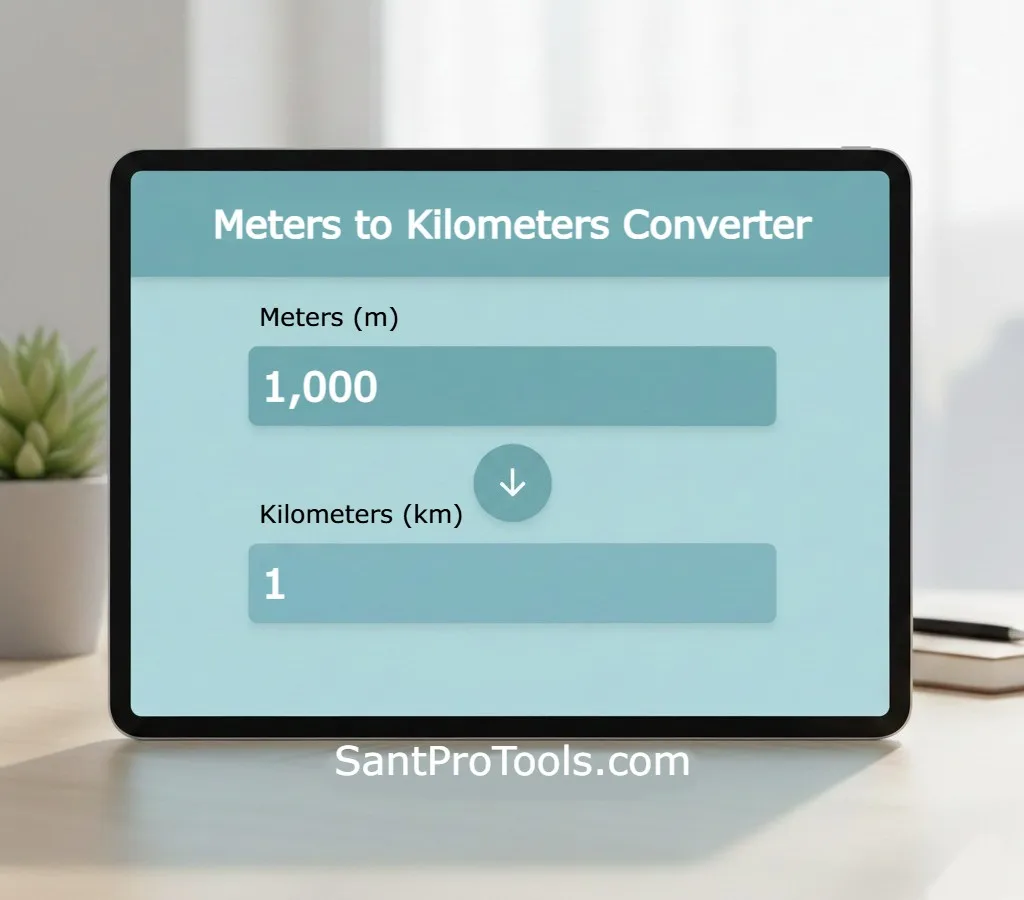Meters to Kilometers Converter - Convert m to km Online
Convert meters to kilometers using our fast and accurate m to km Converter. Enter any value in meters to get the exact kilometer result with formula, steps, and examples.
Conversion Results
Enter values and select units to see conversion results
Related & Other Popular Converters
It is important for students, engineers, travelers, and professionals working with measurements of distances to know how to convert Meters to Kilometers. Because meters and kilometers are both measurements in the metric system, converting between the two is straightforward and very accurate.
Whether you require to know how to convert m to km, understand the conversion meter to kilometers formula, or simply how many kilometers are in 1 meter to km, this full guide will help in understanding this concept with inclusive examples, formulas, charts and FAQs.

What Are Meters and Kilometers?
A meter (m) is the base unit of length in the International System of Units (SI) and typically measures up to moderate sizes of distances such as the distance of a room, a person's height, the dimensions of furniture, and short travel distances.
A kilometer (km) is a larger metric unit that measures longer distances such as the length of a road, travel from one city to another, running tracks, or geographic measurements.
Since both meters and kilometers belong to the same metric system, every conversion meter to km follows a simple ratio:
1 kilometer (km) = 1000 meters (m)
This means that kilometers are 1000 times larger than meters.
Meters to Kilometers Conversion Formula
To convert meters to kilometers, you simply divide the value in meters by 1000.
Formula:
km = meters ÷ 1000
This formula applies to every value, whether you are calculating 1 meter km, 100 meters, or several thousand meters.
Understanding 1 Meter to Kilometer Conversion
If you want to know how much 1 meter to km equals:
1 meter = 1 ÷ 1000 = 0.001 km
So, 1 meter to 1 kilometer is just 0.001 km, which means one meter is one-thousandth of a kilometer.
This is the easy method for conversion meter to kilometer, and you will use this ratio for any number of meters to kilometers.
Meters to Kilometers Conversion Table
Below is a quick m to km reference table to make conversions easier:
| Meters (m) | Kilometers (km) |
|---|---|
| 1 m | 0.001 km |
| 10 m | 0.01 km |
| 50 m | 0.05 km |
| 100 m | 0.1 km |
| 500 m | 0.5 km |
| 1000 m | 1 km |
| 5000 m | 5 km |
| 10000 m | 10 km |
This is useful when converting everyday distances quickly without using a calculator.
Why use an online meters to kilometers converter?
While converting from m to km manually is easy, an online tool will make you convert from meters to kilometers much more quickly and without a margin of error. The SantPro Tools Meters to Kilometers Converter takes input in meters and instantly gives you kilometers by performing the calculation correctly every single time.
Here is what you accomplish by using our Meters to Kilometers Converter:
Whether you're converting 1 meter to km, 1200 meters, or 23,450 meters, the tool will give you a trusted result instantly.
How to convert Meters to Kilometers manually
Below is a basic, step-by-step way to manually convert m to km:
Step 1: Identify the distance in meters
Example: 2500 meters
Step 2: Apply the formula
km = m ÷ 1000
Step 3: Divide
2500 ÷ 1000 = 2.5 km
So, 2500 meters = 2.5 kilometers using the standard conversion meter to km formula.
Real-Life uses of Meters to Kilometers Conversion
The Meters to Kilometers conversion is widely used across many fields, including:
Students frequently convert m to km during math and science lessons.
Athletes calculate running track lengths, marathon distances, and cycling measurements.
Professionals use conversion meter to kilometer for large-scale planning.
Travelers and drivers convert meters to kilometers for road distances.
Researchers convert land measurements, path lengths, and terrain distances.
The ability to quickly convert 1 meter to km or large distances helps simplify planning and calculations.
Example Problems for Better Understanding
Example 1: Convert 350 meters to kilometers
350 ÷ 1000 = 0.35 km
Example 2: Convert 5600 meters to kilometers
5600 ÷ 1000 = 5.6 km
Example 3: Convert 1 meter to kilometer
1 ÷ 1000 = 0.001 km
All examples follow the same conversion meter to kilometer rule.
Advantages of Metric Measurement (m to km)
The metric system is often favored, due to:
For all these reasons, Meters to Kilometers is one of the easiest conversions and most used worldwide.
FAQs
Simply divide the number of meters by 1000. This is the universal conversion meter to kilometer formula.
1 meter to km = 0.001 kilometers, which means one meter is one-thousandth of a kilometer.
1 kilometer = 1000 meters, meaning you need to divide meters by 1000 to get the value in kilometers.
The fastest and most accurate way to convert to kilometers is using the Meters to Kilometers Converter.
Yes, you can convert by multiplying kilometers by 1000 to get back to meters.
You commonly convert from meters to kilometers and kilometers back to meters in classrooms, travelling, sports, construction, engineering and geographical measurements.